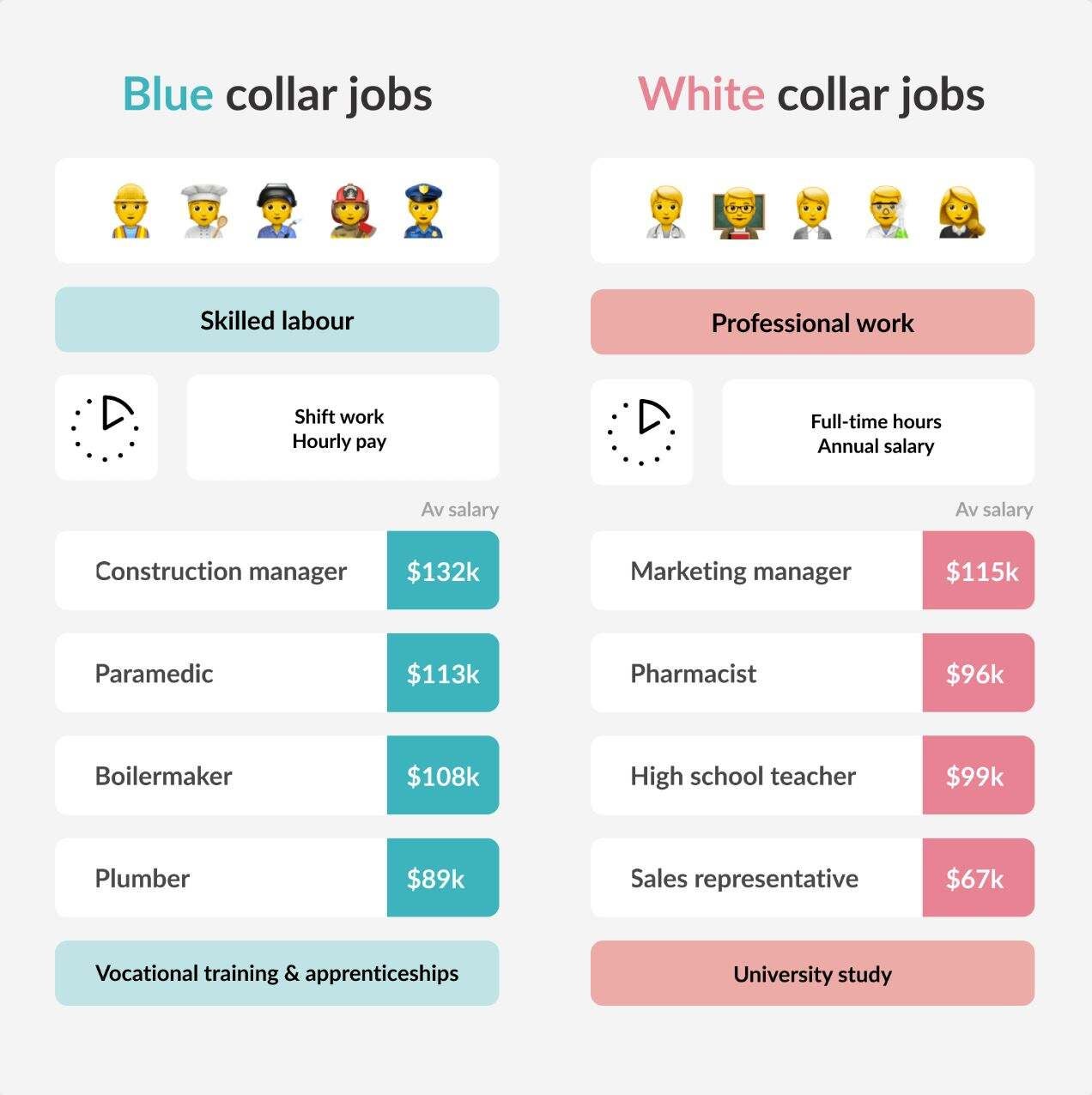Blue Collar vs White Collar Jobs: What You Need to Know

Want to know whether you should do a blue-collar job or white-collar job? Learn more about the differences between the two here.
Chances are, you’ve probably heard of the terms “blue-collar” and “white-collar” before, you may know what they mean. Unfortunately, they’ve been plagued with stereotypes and misconceptions that need to be cleared up — which is what we’ll do today in this guide. Let’s take a look at these two terms more closely.
What’s the difference between blue-collar and white-collar jobs?

As the name implies, white-collar jobs typically refer to working in an office environment, though some can work remotely at home. They consist of administrative, managerial and clerical responsibilities. Essentially, desk jobs.
On the other hand, blue-collar jobs involve manual labour, such as handling heavy machinery and equipment. They typically involve collaborating with a third party contractor. It is also commonly associated with the working class, though nowadays reality does not reflect that. More on this later on.
Examples of white collar jobs
Examples of blue collar jobs
Who makes more money?
The consensus is that white-collar jobs gain more, but that isn’t necessarily true. Since more and more people are going to university, there’s been a saturation of white-collar workers, which may have altered the amount they earn.
As a whole, it depends on your position and how you make your money. White-collar jobs consist of typical nine-to-five work weeks and earn a monthly wage, whereas blue-collar workers are often assigned a set number of shifts, often working early in the morning or late into the night, and are paid by the hour.
That doesn’t necessarily mean that blue-collar workers can’t rake in the high salaries though. For example, a sales representative in Australia earns $67,860 on average while a paramedic earns $85,404 per year.
How to study: the differences
While there are obviously exceptions, in order to qualify for white-collar jobs, you will typically need tertiary education — at the very least a bachelor’s degree in your field of choice.
Blue-collar jobs vary a bit, sometimes you might only need a high school diploma, but nowadays, more and more companies are asking for a vocational degree and an apprenticeship under your belt.
However, as you’ll see by the end of this article, educational requirements for both are becoming more similar recently.
Let’s talk about stigma
For many blue-collar jobs, the vast majority of workers are male (e.g.: 97% of building and plumbing labourers are men). Sexism seems to lurk around every corner, from the education to the workplace to the general macho air associated with these fields. It’s no wonder that women are a bit daunted breaking into the field.
That being said, there are measures in place aiming to close the gap between men and women in the labour force, like the Gender Equality Strategy in the Victorian construction industry (GES).
People might discourage you because of your gender, but just because a particular area is male-dominated, doesn’t mean you can’t be qualified and do a good job.
The narrowing gap
Recently, there’s been a bit of cross over between white collar and blue collar education, and subsequently, certain aspects of work. Gone are the days where blue-collar workers have to slave away at repetitive strenuous tasks. Now they have access to a more diverse array of roles that are more knowledge- and digitally-focused.
According to one report, 70% of blue-collar workers surveyed said that technology had been the most significant factor that had the biggest impact on their work. Because of this, more educational qualifications are being required, with salaries growing higher. The stark division between blue-collar and white-collar has become a thing of the past.

John Mackenney
Spokesperson, Adobe
How technology will change blue and white-collar jobs
“Accessibility to new technologies and the ability for workers to upskill and apply those skills is happening across all industries and roles, irrespective of whether you are a blue-collar or white-collar worker.”
“Technology advancements such as artificial intelligence (AI), machine learning (ML), digital, mobile, and robotics are being embedded into businesses from boardrooms to distribution warehouses, from data centres to agriculture and healthcare.”
“New technologies have irreversibly changed many professions, so being able to digitally upskill or reskill is crucial to maintaining employability and expertise.”
Digital upskilling and reskilling isn’t just for white-collar workers anymore. If you’re in a blue-collar profession, you can keep in step with changing industries by continually upgrading your skills — on-demand and as-needed.
You have a range of options, including:
The third option can be great if you want to complement your formal study, you’re unsure of what skills you need to develop further, or just want to get a taste of a particular area to see if you like it.
Skill Finder was built for this very purpose, and could be a good place to start.
“Built by Melbourne-based Balance Internet and powered by trusted organisations such as Adobe, provides all Australians free access to a broad range of digital ‘microskills’,” says John Mackenney, Spokesperson for Adobe.
“There are more than 3,200 free online courses, some as short as 2 hours in duration, that can provide immediately applicable skills regardless of current knowledge or experience.”
Simply put, if you want to work in an office and think of yourself as more academically inclined, then a white-collar job should be more suited to you. But if you want to be more practical, then go for blue-collar — and proactively upskill for career progression.


